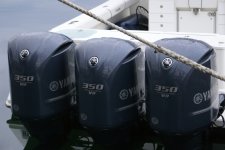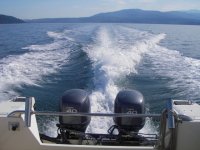OK I have read a few threads on this and people seem to have their opinions on using twin 40 or 50 HP engines or a single 90 (or similar) HP + a 9.9ish kicker. I am undecided on what the best option is. Here are some things I have heard and I would love to get opinions from C-dory owners.
Single + Kicker
- Good because you only have one large engine to maintain.
- Bad because people tend to not use their kicker so when they need them, they don't work.
Twin
- Bad because you cannot get counter rotating props in 40-50 HP so the boat tends to turn when you accelerate. Is this true? Can anyone confirm or deny this?
- Bad because you have two large engines to maintain approximately doubling your engine maintenance cost
- Good because they look cool
- Good because you always tend to use both engines so if one breaks down you can still get home at a reasonable speed.
- Good because you get better fuel consumption. At least that is what the performance spec say on the c-dory site. Anybody have any other experience on this front?
Any other pros/cons for these two setups?
Thanks for any input.
Glen
Single + Kicker
- Good because you only have one large engine to maintain.
- Bad because people tend to not use their kicker so when they need them, they don't work.
Twin
- Bad because you cannot get counter rotating props in 40-50 HP so the boat tends to turn when you accelerate. Is this true? Can anyone confirm or deny this?
- Bad because you have two large engines to maintain approximately doubling your engine maintenance cost
- Good because they look cool
- Good because you always tend to use both engines so if one breaks down you can still get home at a reasonable speed.
- Good because you get better fuel consumption. At least that is what the performance spec say on the c-dory site. Anybody have any other experience on this front?
Any other pros/cons for these two setups?
Thanks for any input.
Glen


